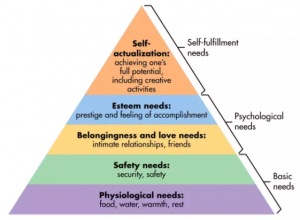Hierarchy of Needs?
I’m sticking my neck out this week to take issue with one of the most common ‘understandings’ about human psychology.
I’m not a qualified psychologist and I don’t know all the answers, but this just doesn’t make sense from my point of view.
Abraham Maslow in 1943 came up with a ‘Hierarchy of Needs’ which is often (perhaps too often) referred to in personal development programmes as it is said to lay out what motivates us.
The theory is there are 5 levels of needs, usually illustrated as a pyramid, consisting of basic, psychological and self-fulfilment needs we are ‘automatically’ motivated to fulfil.
These ‘needs are (from the bottom of the diagram):
Physiological – Safety – Belongingness – Esteem – Self actualisation

According to Maslow the Basic and Psychological needs (the lower four levels) are ‘Deficiency’ needs and the motivation to fulfil them decreases as they are satisfied.
The top level he describes as a ‘Being’ or growth need where motivation increases as the elements in it are met.
Now here’s the thing. Back in 1943 Maslow was adamant that all the needs in the lower levels starting with the physiological needs must be satisfied (in full) before an individual can progress to the next level.
This is the understanding of most people who’ve been ‘taught’ psychology at lower levels of education and also what comes across in many personal development programmes.
According to this tenet, you or I cannot reach self fulfilment until everything else is in place.
In my opinion this idea is just ‘wrong’ – and Maslow did admit in 1987 he had given “the false impression that a need must be satisfied 100 percent before the next need emerges” and the satisfaction of the needs he outlines is not an “all or none” phenomenon.
I would go further than that.
Whilst all of the needs identified, and more, are valid, they are not, in my opinion and experience hierarchically dependent.
It’s quite possible for example, to satisfy some or all of the ‘belongingness’ (or relationship) needs, without having satisfied, even partly, all, or any, of the ‘lower level’ needs.
Then as far as the ‘higher’ need of ‘self-actualisation’ is concerned, I would equate this with self-fulfilment, self determination or finding one’s personal freedom.
Maslow places these at the ‘top’ of the pyramid with the implication that none of them can even be started on until everything else is ‘done’ – which makes them more or less unattainable for most people.
We know this is not true. You and I can be free, we can be fulfilled, we can be ‘self-actualised’ (or our true selves) without satisfying, even partly, all the ‘lower level’ needs identified.
Further it’s counter productive in terms of our self-development to completely satisfy any of these needs, as long as the measure we have in our own mind for them is for each to be ‘fit for purpose’, that is, fit for our purposes rather than any measure imposed or suggested by anyone else.
I would turn all this on its head and start with the idea we are who we are.
Marisa Peer says we are born ‘perfect’ – we start off with pour own self actualisation at the ‘base’ level and then develop and maintain it as we become aware and ‘grow up’ in the world.
You and I define our own needs, our own individual needs which we wish to satisfy on our journey. We may not require all those things shown in Maslow’s triangle.
It’s up to you and it’s up to me to decide who we are, what we wish for, and how we achieve it. There are no preconditions to be satisfied other than those we seek.

